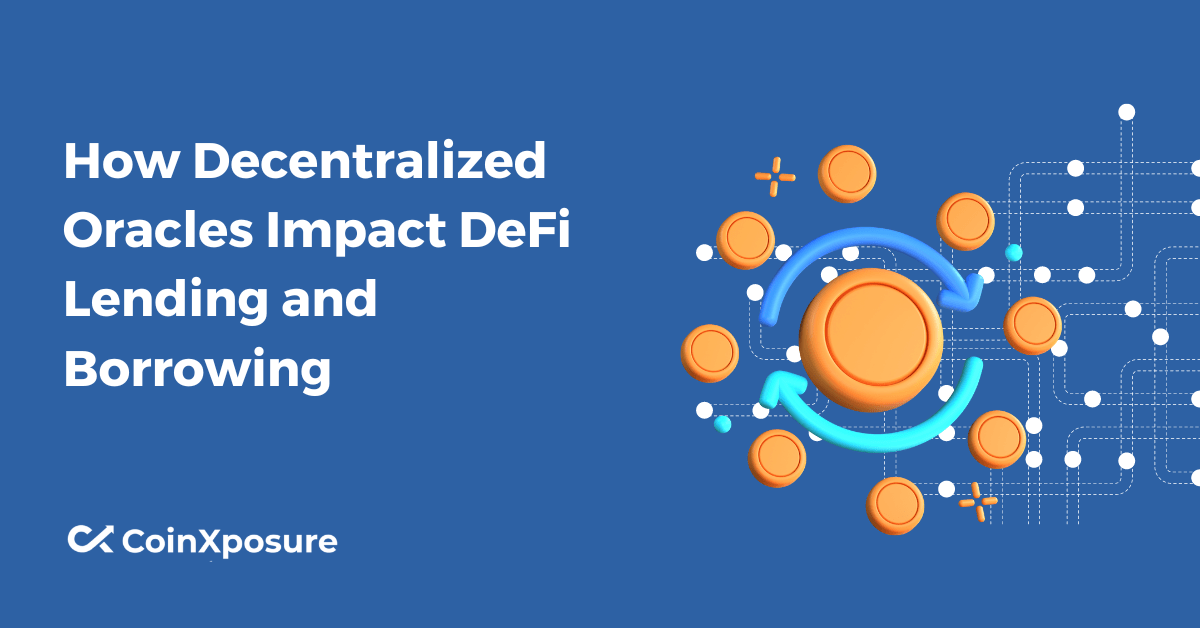
How Decentralized Oracles Impact DeFi Lending and Borrowing
The advent of decentralized finance (DeFi) has revolutionized traditional financial systems, providing users with borderless and permissionless access to a myriad of financial services.
Central to the functioning of DeFi protocols is the role of oracles, decentralized systems that fetch and verify external data.
In the context of lending and borrowing within DeFi, decentralized oracles play a pivotal role in ensuring the accuracy of price feeds, automating smart contract execution, managing risks, and fostering broader market access.
This article explores the profound impact of decentralized oracles on DeFi lending and borrowing dynamics, shedding light on their significance in enhancing security, transparency, and overall efficiency in this decentralized financial landscape.
Decentralized Oracles in DeFi
Decentralized oracles form the backbone of the rapidly evolving decentralized finance (DeFi) ecosystem.
Unlike their centralized counterparts, decentralized oracles source and verify real-world data in a trustless manner, contributing to the autonomy and security of DeFi protocols.
These oracles bridge on-chain smart contracts and off-chain data, crucial for functions such as price feeds, market information, and other external inputs that impact financial transactions within the DeFi space.
By decentralizing this data retrieval process, these oracles aim to eliminate single points of failure, resist manipulation, and enhance the reliability of information crucial for DeFi applications.
In essence, decentralized oracles empower DeFi platforms with the ability to execute complex financial agreements autonomously, ensuring the accuracy and integrity of the data that influences lending, borrowing, and other decentralized financial activities.
Their role is foundational, establishing a resilient framework for trustless and transparent financial interactions within the decentralized landscape.
Impact on Price Feeds
The impact of decentralized oracles on price feeds within the DeFi space is profound.
These oracles play a pivotal role in providing accurate, real-time, and decentralized pricing information, influencing various aspects of lending and borrowing:
- Accuracy and Reliability
- Minimizing Manipulation Risks
- Ensuring Real-Time and Decentralized Information
Accuracy and Reliability
Decentralized oracles enhance the precision of price feeds by aggregating data from multiple sources.
This minimizes the risk of inaccuracies or manipulation, ensuring that DeFi platforms receive trustworthy information for making critical financial decisions.
Minimizing Manipulation Risks
Centralized oracles are susceptible to manipulation, posing a significant risk to DeFi platforms.
Decentralized oracles distribute the data-fetching process across a network, making it more resilient to manipulation attempts, ultimately safeguarding the integrity of price feeds.
Ensuring Real-Time and Decentralized Information
The speed at which price information is updated is crucial in DeFi transactions. Decentralized oracles leverage multiple data sources to provide real-time updates, enabling DeFi protocols to respond promptly to market changes and maintain the accuracy of price feeds.
In summary, decentralized oracles substantially enhance the reliability and security of price feeds within DeFi, contributing to the overall efficiency and trustworthiness of lending and borrowing activities in decentralized financial ecosystems.
Risk Management of Decentralized Oracles in DeFi
Decentralized oracles play a crucial role in risk management within the DeFi sector, offering several benefits to lending and borrowing platforms:
- Diversification of Oracle Sources
- Addressing Single Points of Failure
- Mitigating Flash Crashes and Anomalies
Diversification of Oracle Sources
Decentralized oracles aggregate data from multiple sources, reducing reliance on a single data provider.
This diversification minimizes the impact of potential inaccuracies or malicious data manipulation, enhancing the overall robustness of risk management strategies.
Addressing Single Points of Failure
Traditional finance relies on centralized data sources, creating vulnerability to single points of failure.
Decentralized oracles distribute data retrieval across a network of independent nodes, mitigating the risk of a central authority or server failure that could disrupt lending and borrowing activities.
Mitigating Flash Crashes and Anomalies
Decentralized oracles help mitigate the impact of sudden market fluctuations or anomalies.
Cross-referencing data from multiple sources contributes to a more accurate representation of market conditions, reducing the likelihood of triggering erroneous liquidations or loan repayments during volatile periods.
In essence, decentralized oracles enhance risk management in DeFi lending and borrowing by promoting diversification, mitigating vulnerabilities, and providing a more reliable assessment of market conditions.
Their decentralized nature contributes to the resilience and security of the overall DeFi ecosystem.
Market Access and Liquidity of Decentralized Oracles in DeFi
Decentralized oracles significantly impact market access and liquidity within DeFi lending and borrowing:
- Expanding Access to Various Assets
- Facilitating a Broader Range of Financial Instruments
- Improving Overall Market Liquidity
Expanding Access to Various Assets
Decentralized oracles enable the inclusion of a broader range of assets within the DeFi ecosystem.
By providing accurate and decentralized price feeds for various tokens and assets, these oracles facilitate the creation of diverse lending and borrowing markets, expanding opportunities for users to engage with a wide array of digital assets.
Facilitating a Broader Range of Financial Instruments
With reliable price information from decentralized oracles, DeFi platforms can offer a more extensive selection of financial instruments.
This includes collateralized loans, synthetic assets, and other innovative financial products contributing to a more dynamic and versatile DeFi landscape.
Improving Overall Market Liquidity
Accurate price feeds from decentralized oracles enhance market liquidity.
By enabling a more diverse range of assets to be utilized as collateral and traded within DeFi protocols, these oracles foster a more liquid and efficient marketplace.
This liquidity benefits lenders and borrowers by providing smoother transaction processes and improved price discovery.
In summary, decentralized oracles are pivotal in broadening market access and improving liquidity in DeFi lending and borrowing, fostering a more inclusive and dynamic decentralized financial ecosystem.
Decentralized Governance of Decentralized Oracles in DeFi
Decentralized oracles also extend their influence to governance structures within the DeFi space, contributing to more inclusive and community-driven decision-making processes:
- Involving the Community in Oracle Decision-Making
- Ensuring Protocol Upgrades and Adaptability
- Enhancing Decentralization in the Governance Process
Involving the Community in Oracle Decision-Making
Decentralized oracles often incorporate governance mechanisms that allow token holders and participants in the ecosystem to have a say in important decisions.
This community involvement ensures that key aspects of the oracle network, such as data sources and protocol upgrades, reflect the consensus and preferences of the broader DeFi community.
Ensuring Protocol Upgrades and Adaptability
Through decentralized governance, oracles can adapt to changing market conditions and technological advancements.
This flexibility is essential for maintaining the relevance and efficiency of the oracle network, ensuring it can evolve to meet the needs of the DeFi ecosystem over time.
Enhancing Decentralization in the Governance Process
Decentralized governance in oracles contributes to a more democratic and resistant decision-making process.
It reduces the risk of centralization in key decision points, aligning with the decentralization principles underpinning the DeFi movement.
Decentralized oracles provide critical data infrastructure and actively involve the community in governance processes. This participatory model contributes to the decentralized and democratic nature of the broader DeFi ecosystem.
Challenges and Considerations of Decentralized Oracles in DeFi
Despite their transformative role, decentralized oracles in DeFi face several challenges and considerations:
- Security Concerns in Oracle Networks
- Scalability Issues and Potential Bottlenecks
- Regulatory Considerations and Compliance
Security Concerns in Oracle Networks
Decentralized oracles can be vulnerable to attacks, data manipulation, or collusion among network participants.
Ensuring robust security measures, cryptographic protocols, and continuous audits becomes crucial to maintaining the integrity of data feeds.
Scalability Issues and Potential Bottlenecks
As the DeFi ecosystem expands, the scalability of decentralized oracle networks may become a concern.
Increasing transaction volumes and the need for real-time data present challenges that require scalable solutions to prevent network congestion and delays.
Regulatory Considerations and Compliance
DeFi, including decentralized oracles, faces evolving regulatory landscapes. Compliance with regulatory requirements, especially concerning data sources and financial data provision, is a critical consideration that may impact the adoption and sustainability of decentralized oracle networks.
Addressing these challenges necessitates ongoing innovation, collaboration within the DeFi community, and a commitment to robust security practices.
As the space matures, finding solutions to these challenges will ensure the continued growth and resilience of decentralized oracles in the DeFi ecosystem.
Conclusion
Decentralized oracles wield a transformative influence on DeFi lending and borrowing, ushering in a new era of trustless, transparent, and efficient financial interactions.
These oracles serve as the linchpin between on-chain smart contracts and off-chain real-world data, fundamentally shaping the dynamics of decentralized finance.
Their impact on price feeds ensures accuracy, reliability, and resistance to manipulation, fostering a secure environment for DeFi protocols to execute lending and borrowing agreements.
Decentralized oracles contribute to risk management by diversifying data sources and mitigating vulnerabilities, enhancing the resilience of the DeFi ecosystem.
Decentralized governance mechanisms embedded within oracles empower the community to actively participate in decision-making processes, ensuring adaptability and aligning with the decentralized ethos of the broader DeFi movement.
However, security concerns, scalability issues, and regulatory considerations underscore the need for ongoing innovation and collaboration within the DeFi community.
Overcoming these challenges is imperative for sustaining the growth and resilience of decentralized oracles, as they continue to shape the future of decentralized finance.
In navigating these complexities, the DeFi ecosystem benefits from the continued evolution and integration of decentralized oracle solutions.





